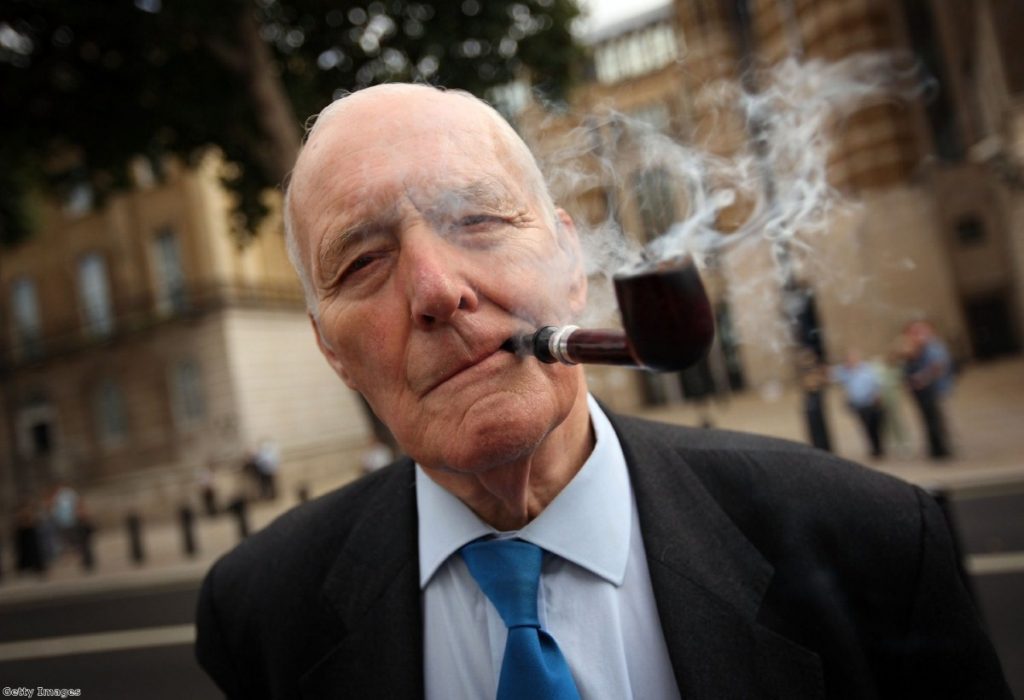The socialism of humanity: A tribute to Tony Benn
Many years ago, where Parliament Square turns into Millbank, I spotted Tony Benn. He was sat on a low wall, alone, smoking his pipe and basking in sunlight.
I'm not usually reticent about approaching people nor nervous talking to them. But he was too big. His influence had been too great. At best, I would have garbled out a stream of gushing praise. At worst I would have been simply speechless. I chickened out.
Benn was not lacking in people telling him how much he meant to them – moments after I failed to do so a couple of middle aged women, evidently braver than I, did precisely that. But I still regret that I didn't tell him how he taught me the best side of socialism and the appropriate manner in which to conduct politics.
I first heard him in the back seat of my parent's car when I was in my early teens, on a radio documentary about Karl Marx. Benn said something about Marxism which I never forgot: That it was for those who could not understand why there should be people without homes when builders are out of work.


That is the great moral truth of socialism, the question which everyone who opposes it must answer. And there are answers to this question – some of them good – but they all involve a sacrifice, not just of logic and utility, but also of moral purpose.
As I grew up I found this idea reflected everywhere in the world around me. If I sat on a plane with an empty seat next to me, for instance, I would think about the person who was desperate to take that flight but could not afford it.
It is an idea which reveals the world as a place which is built not for humans, but for capital.
It is an idea which allows you to think in a way which political discourse rarely allows: about what people need, rather than what they can be sold. It is a fundamentally different view of politics, one in which the person comes first.
Socialism is a system which can readily turn to tyranny, but it has a human heart, a decent heart, and Benn was the person who first showed it to me.
In the teenage years that followed I became something of a die-hard socialist, of the sort you often become during that period in your life, when dogma and conformity are peculiarly seductive.
Then one day I saw Tony Benn again, this time on television, and once again he said something which fundamentally altered the way I saw the world.
He had just delivered a fierce speech in front of an admiring crowd. At the end he sat down on the stage, his legs dangling over the side, lit up his pipe and poured out a cup of tea from his thermos. A man approached him and explained that he was a Tory. He wanted to say something else, but Benn interrupted. "Oh, I do hope I haven't said anything which upset you."
He showed that politics, no matter how principled or drastic, did not need to be mean or cruel. Once again, he revealed the humanity within.
It was a lesson in the radicalism of politeness, in how manners and consideration are the lifeblood of an egalitarian society.
Far-left circles are not very kindly places, in my experience. Most people in them are harsh and often unsympathetic, driven more by dogma than by compassion.
But here was this man, this figurehead, who would always say what he pleased, who would tolerate no moral or political compromise. And yet he never lost his civility or his tenderness.
It is a testament to Britain that its great far-left figurehead was such a man, who would sit and drink tea and worry about the feelings of Conservatives listening to him. And it is a tribute to the British left, that its spiritual leader should be a man motivated not by political programmes but by humanity.
"If we can find money to kill people, we can find money to help people," he said once.
Benn's was the best kind of socialism. It was the socialism of reaching out. Of touching people.
I regret not talking to him when he sat on that low wall, and telling him that he taught me the value of socialism and the value of civility.
But I am also happy that I have that image of him, smoking in the sunlight, looking away from parliament at the people in the street.












